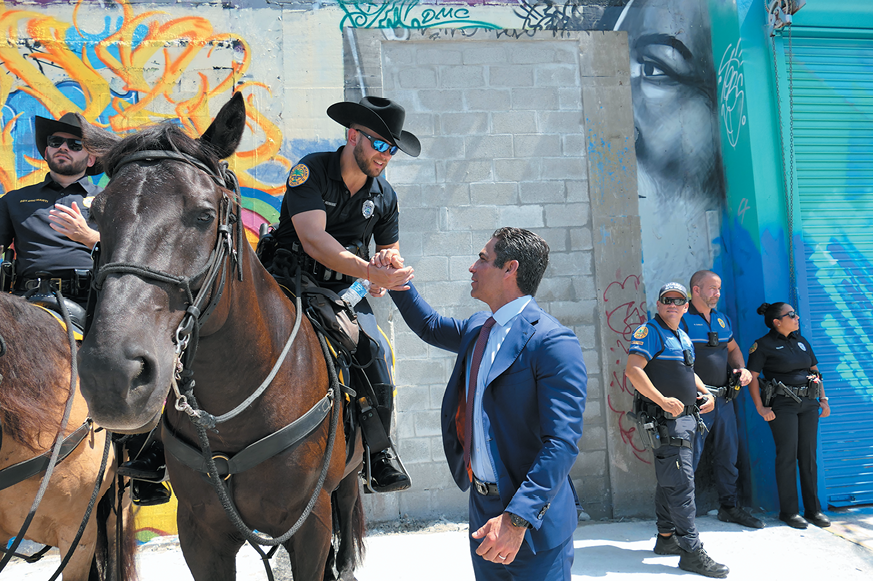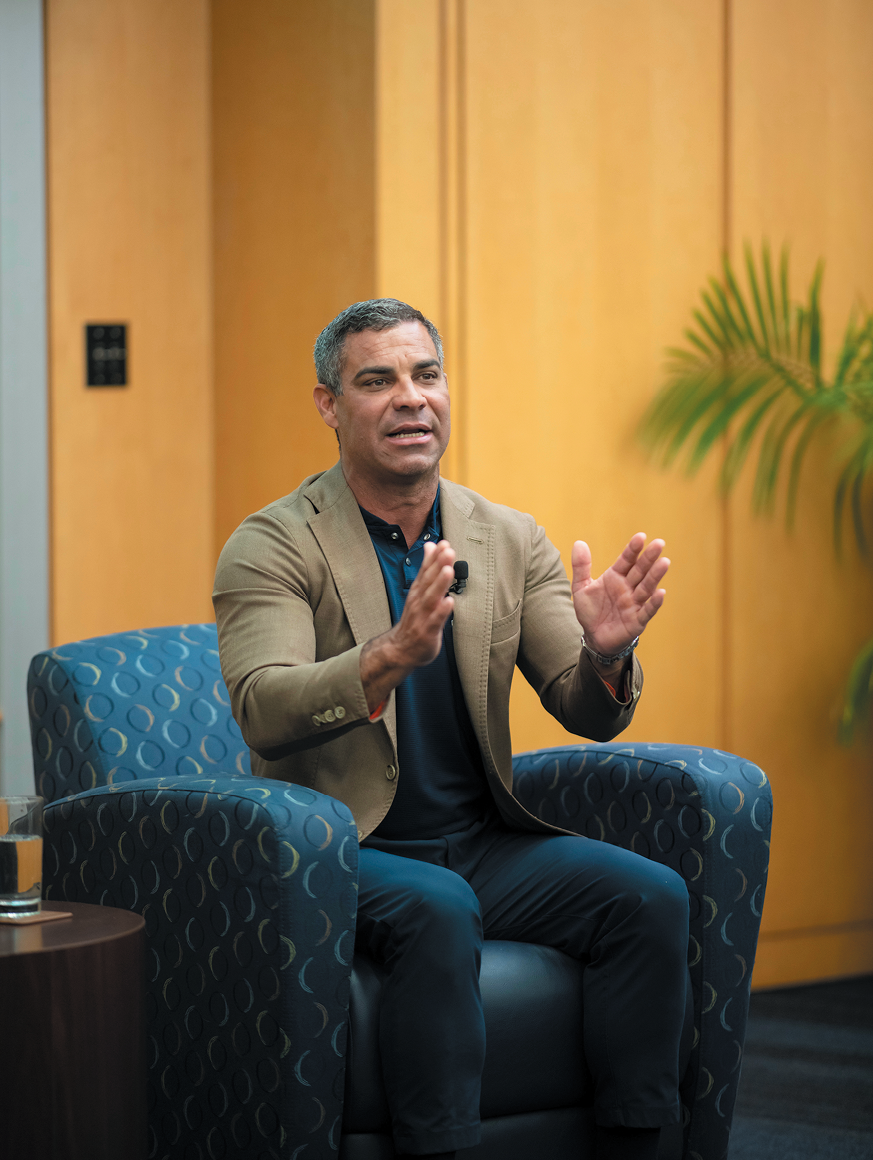- Home
- Media Kit
- MediaJet
- Current Issue
- Past Issues
- Ad Specs-Submission
- Reprints (PDF)
- Photo Specifications (PDF)
- Contact Us
- PRIVACY POLICY
- TERMS OF USE
![]()
ONLINE
![]()
ONLINE

Building A
Future-Proof City
Editors’ Note
Francis Suarez is the 43rd Mayor of Miami. As the first Miami-born mayor, he is committed to building Miami into the capital of capital. First elected with a mandate of 86 percent and then re-elected with a mandate of nearly 79 percent, Suarez has championed the integration of climate adaptive policies, Web 3.0 technology, and a free-market approach to all facets of government as part of his Miami for Everyone agenda. Under his leadership, Miami has cut taxes and reduced homicides to one of their lowest levels in more than 70 years, spurring a broad-based economic expansion across Miami. Suarez has also pursued a package of affordable housing reforms that leverages federal opportunity zones with the activation of underutilized land to the supply and overall access to affordable housing for working people. Most recently, Suarez has championed the development of Miami’s tech economy through Venture Miami, now known as the Economic Development Team, along with initiatives that connect education and job training to Miami’s new emerging economic sectors such as Fintech, Medtech, and Greentech. As the son of former Miami Mayor, Xavier L. Suarez, he learned the values of inclusive, servant-leadership to drive economic prosperity, personal opportunity, fairness, equal rights, and reconciliation for all. Suarez was also named as a Time Future 100 Leader. He was named the 20th Greatest Leader in the World by Forbes Top 50. Suarez previously served as President of the U.S. Conference of Mayors. He also practices law as Of Counsel for Quinn Emanuel LLP, an international law firm. Suarez earned his bachelor’s degree in finance from Florida International University, graduating in the top ten percent of his class, and then received his law degree from the University of Florida Levin College of Law, where he graduated cum laude.
Will you discuss your career journey and what attracted you to public service?
Public service for me was not a foregone conclusion. I had seen my father serve as mayor for eight years and there was a lot about politics that I found interesting and at some level attractive. There were also a lot of things about politics that frankly turned me off. I think it wasn’t until I bought a home, got married, and was living in a modest neighborhood that I realized that I was called to do something more for the community that helped me succeed. And that was a calling that I felt deep inside. I was about 30 years old, I had a small business, and I decided to run for office. I was barely elected by 260 votes to the city commission in 2009. So, for me, it was a journey of witnessing a leader that I respected and admired, and also feeling an obligation to be part of the solution in a city that I was born and raised in, and that I love very much.

Mayor Suarez greets City of Miami police officers
on horseback during a community engagement
How do you describe Miami’s strengths?
Miami’s strengths are in its people, its diversity, its climate, and its culture. It’s very welcoming. I have people tell me all the time who come from other places and arrive in Miami that they feel they can integrate quickly and that there aren’t many barriers to entry.
What are the priorities of your admin-
istration?
The priorities of my administration are to build a city that’s future-proof, and to focus on building the kind of city that invests in things that appreciate your most precious asset, which is your time. It’s the one finite asset we all share that you can’t get more of, particularly if you don’t take care of yourself. So, we focused on health and wellness. We focused on parks, spending hundreds of millions of dollars on our parks. We focused on quality-of-life issues such as crime. We’re on pace to have the lowest homicide rate in history. We focused on quality-of-life issues such as income, making sure right now we have the lowest unemployment in America, and the highest wage growth in America. We are doing that by setting the economy of the future, focusing on tech and finance which pay well and help supercharge the businesses of tomorrow. That’s what we’ve tried to do in a comprehensive ecosystem type of fashion. We do that by working with multiple partners from school boards, to charter schools, to universities, to businesses, to leaders – setting the tone and the framework for an ecosystem that’s going to succeed into the future.
How concerned are you about the partisanship that exists today and what can be done to bring people together?
It’s concerning because what I’ve noticed when I travel the world is that we have a lot more in common as people than what separates us. And, of course, there are institutions like the press that oftentimes seems to have a vested interest in having us fight with each other as a means of capitalizing on creating drama and conflict that they can then talk about. I think everybody wants their tomorrow to be better than yesterday – in other words, have a brighter future. They want peace and prosperity for themselves and their children. They want a situation where their children can inherit a life that was better than theirs. These are common themes, no matter what religion you’re from, no matter what culture you’re in, no matter what country you live in. As Americans, we should want to build our economy and our ecosystem around the pillars that made America what it is, right? Freedom, democracy, the ability to disagree and not lose your freedoms as a result. Having a capitalistic economy where if you work hard, if you play by the rules, if you get educated, you have a better chance to succeed and to pass that success along to your children so they can go to good schools and they can themselves succeed. So, it’s a cycle and if we invest in that cycle, we’re going to get returns on our investment.

Mayor Suarez speaks to students at
Florida International University
about the future of innovation, technology,
and leadership in Miami
What advice do you offer young people beginning their careers?
A few things. One is, never get down on yourself early on in your career. My journey was not the prototypical success story of attending an Ivy League school, never making a mistake, etc. I went to my local public school and went to my local public law school. They were both good schools. I didn’t start off doing that great at the beginning of my career and I kind of flipped the switch and realized that if I wanted to succeed, I needed to go to law school, which meant putting in energy and effort and work. So, one thing I would tell kids is that there are no shortcuts. You need to work hard to achieve anything in your life.
This leads to point two, which is to do something you’re passionate about, because the amount of work that it takes to be successful and the amount that you have to grind and you have to dedicate, you need to be doing something you like. I think the third component is not to be so hard on yourself.
Today, there are no barriers to success. You used to have to go to the right school and the right graduate school to get a great job, but now you can build products using a lot of the tools that are available at no or low cost. The information that’s available through podcasting, through free forums, is unbelievable. You can educate yourself in ways that exceed probably PhDs, and you can become an expert in your field. For example, I became an expert at some level at crypto, and it was all self-taught. So, there’s just no barrier to being able to learn more and improve yourself.
With the impact and success that your administration has achieved, are you able to enjoy the process and take moments to celebrate the wins?
Definitely. I actually try to do it every day. I have a great staff. I have people who are full of energy, and who bounce that energy back to me every single day which allows me to savor the wins – and the wins aren’t always the big wins. There have been a lot of big wins and we are going to continue to have big wins for the remainder of the time that I’m here, but I also savor the little wins. The homeless person that we help; the person who we got groceries for; the person who has a permit stuck that we make happen. Every single little victory is a victory for the mission, which is to help people and to create a place where everyone can have an opportunity to be successful.
How do you want to be remembered?
I want to be remembered as someone who tirelessly worked to benefit the community they were born and raised in. I was the first mayor in Miami who was born in Miami. That makes me uniquely tied to my city. I was also the first son of a mayor, and I think the combination of those two things bind me in a special way to the city because I grew up as someone who was the son of a leader and someone who was taking care of and shepherding the city. Then I got that opportunity myself in the city that I grew up in. I feel this is a very unique experience. I want to be remembered by Miamians as someone who cared deeply about the city, who put their interests first, who worked tirelessly to make their future better, and who was able to elevate the perception and the profile of the city from a capital of Latin America to a truly global city.![]()